- Home
- Colleen Nelson
Finding Hope Page 2
Finding Hope Read online
Page 2
Something crinkled in my pocket. I hoped for money, a forgotten five-dollar bill, but it wasn’t, it was one of Hope’s poems.
Remember the swings
Flying up
Never landing
Stomach floating and dropping
You’d push me
Higher.
I never wanted you to stop.
Now I say
Stop.
Sometimes when I read them, they made me cry. Because she still knew me. She hadn’t given up.
I plod. Walking from one park bench to another, hiding out by the tracks, in a thicket of trees. I had my spots. Most of the day, I slept anywhere. I got kicked out of places where they used to know my name. Used to fucking bang on the glass at a game, shouting my name! “Give ’em hell, Eric!” Roaring when I scored, top shelf in overtime on a breakaway. Teammates clobbering me with jubilation. Everyone knew my name then.
Today, I was hanging out by the grocery store, sitting on the sidewalk. A song ran through my head. “Good Old Hockey Game.” I muttered the few words I remembered. This was how I spent my days. Sleep, plod, sit. Get high. They stretched one into the other. Didn’t know what day of the week it was most of the time.
Someone stuck a fiver in my face. I didn’t look up, but saw her old-lady shoes beside me on the sidewalk. The beige kind, with thick rubber soles. “There’s a lunch special on at the diner today. Tell them Gertie sent you.”
“Thanks,” I mumbled, crumpling it in my hand.
I couldn’t look up. Didn’t want to see her face, the pity or disgust on it. I didn’t even want her money, given with a condition: food, not drugs.
The lyrics to the song came all of a sudden, like a thunderclap in my head. Now the final flick, of a hockey stick, and one gigantic scream: “The puck is in! The home team wins!” At the good old hockey game. I started laughing, cackled like a crow, I was so happy I’d figured it out. From the corner of my eye, I saw the old-lady shoes take off.
Five bucks was enough to score me a high.
I started walking to Tyler’s place, an old shed outside of town. The dusty road stretched out till forever in front of me. If Tyler was cooking, he’d let me crash there and keep him company. Maybe spot me a sample too. Reason enough to keep plodding.
Hope
I knew he’d come by today. I’d left a note at the stump telling him Mom and Dad were going into town for a movie. He’d have the run of the kitchen and a shower if he wanted it.
Eric came in through the back door, which I left unlocked, despite Dad’s rule. “Hey,” he said, coming up to the couch, a banana in his hand, already unpeeled and half-eaten. He wasn’t high. His eyes didn’t jerk around like they were on a marionette string. “What’s up?” His voice flat.
I moved over on the couch so he’d sit beside me. Pictures of us as kids lined the mantel. First day of school; Eric in his hockey gear, a menacing grin on his face and another photo of him holding a trophy. Like a time capsule, we didn’t change in those photos.
“Remember I told you about that school, Ravenhurst?” He gave a noncommittal nod. “I got accepted.” I waited for a reaction, not sure what it would be. His rages were unpredictable.
He raised his eyebrows. “You’re leaving.” Not a question.
I nodded. “Next Monday. School starts Tuesday.” Things he’d know if he still went to school.
He tossed his banana peel onto the coffee table. It sat there, limp and empty. “So, that’s it, huh? Mom got one of us out of this fucking shithole.” Not the one she’d expected, either. He didn’t say it out loud, but we both knew it was true. Stuck here her whole life, Mom’s biggest regret was staying in Lumsville. She should have left when she graduated, but she’d already met Eric’s dad. Five years later and she was the widowed mom of a three-year-old and needed her parents nearby. Then she met Dad and had me.
Trapped.
Every fingernail scrapes
On shut doors,
Ripping off.
At least the blood
can escape.
She wasn’t going to let Eric and me fall into the same trap. Her plans for us had always included leaving Lumsville. I would go to a big city for university, that was a given. Money from my grandparents was banked for tuition. But Eric, his ticket out had been hockey.
He’d been scouted the year he turned fifteen. Coaches wanted him on their teams, they took him to special practices and tournaments in places so far he had to fly there. Dad worked overtime to pay for it. Mom would flutter with excitement when coaches called to talk with her about Eric’s future. She’d tousle his hair with pride when he walked in the door.
And then it all changed. One day, his coach dropped him off after a tournament in a town too far for us to go. Mom asked Eric how it went, but he ignored her, went to his room, and shut the door. He didn’t come down till the next day, for school. Mom blamed his moodiness on hormones, his real father, the pressure of hockey.
Finally, I think she blamed herself. She’d pushed him too hard. He burnt himself out. Somewhere along the way, he found meth. Or meth found him.
It was a win for me by default, because all the money that used to be funnelled into Eric’s hockey would pay for me to attend the Ravenhurst School for Girls.
“You could come visit me,” I said, knowing it was a stupid thing to say. How would he get there? Drive to the city with Mom?
He nodded like it was a possibility. Sometimes we kept the lie going, pretending things were normal.
I tucked my hands between my knees and looked at him, my mouth twitching with an unasked question.
“What?” he asked.
“If I’m not around, how are you going to, you know, manage?” Without me? No one would be around to drop food off for him, or clothes. Or money. I know Mom gave him some when she could, but it came at a price. He had to be clean and sneak around so Dad didn’t see him. “Are you going to be okay?”
“Pfft.” He blew air out of his cheeks like it was no big deal. “Yeah.”
“Really? Because I’ve left you a lot of money this summer. What are you going to do without it?” Twenty percent of my babysitting earnings went to the stump and he was acting like it didn’t matter.
His eyes got cold. “I don’t have a bed, or food, either, but I’m surviving.”
A dig. A reminder that I was still at home and he wasn’t. I bit back my retort. I’d stuck out my neck for him a hundred times.
His words hurt. I felt my insides curdle. It was his choice to live this way, I reminded myself. We’d all given him chances, even Dad. But when he’d stolen Mom’s bank card and drained her account of hundreds of dollars, that was the last straw. Mom and Dad had the locks changed, and left a pile of his clothes on the front steps.
“You could stop using,” I said, “and move back.”
The suggestion hung between us. He pinched his mouth closed and shut down. I’d wrecked his coming over. Now he’d leave angry, slamming the door and disappearing for days.
It wasn’t my fault he was a user.
But somehow, I felt like I’d let him down.
Eric
I’d acted like it didn’t matter. Like losing Hope was no big deal.
But inside, I shrivelled.
And then felt like an asshole, because the real reason I didn’t want her to go was because it meant I’d have to find money somewhere else.
I told her it was for food. She believed me because she wanted to.
I wished it were the truth. I fooled myself into believing that I went to see her because I missed her, but the reality was I needed my next high and Hope would give me the money to make it happen.
I didn’t blame her for leaving, though. She was smart to get out of this shithole. I should have gone when I had the chance, now it was too late. Hockey, my ticket out of Lumsville, was
done. I’d sold my equipment months ago, using meth to burn away the hurt.
I couldn’t think about hockey anymore without thinking about him. The two were intertwined. I swear, I could even smell him on my gear. He’d infested it.
I wanted to kill the germs he’d planted in me, but I didn’t know how. They grew like dark, twisting vines, coiling through my insides. Suffocating me from the inside out.
“Fuck,” I mumbled. The meth was messing with my mind. I was starting to think like a fucking poet too. Spewing mental diarrhea, just like my sister.
Hope
Mom and I in the car, contained. Pale wheat fields stretched out to the horizon on each side of the road. The sky was a watery blue but grew darker as it met the land. Occasionally, a farmhouse or service road dotted the landscape.
Harvest
Farmers (wheat killers).
Threshers; the monsters that mow it down
A battle
Against what they sowed.
Irony of the prairies.
Grabbing an old gas receipt, I jotted the words down and stuffed it into my pocket.
“Oh,” Mom sighed, “I forgot to pack your bathing suit.”
Like I was going to the moon. Ravenhurst was three hours away, door to door. She’d be seeing me in less than three weeks when she came in for my birthday. So far, no swimming parties were planned.
But still, her constant second-guessing made me nervous, like I wasn’t prepared. She was quiet, comparing the list of things she’d wanted to pack for me to what had actually made it into my bag. The last time we’d barrelled down the highway had been for the interview. She’d been more nervous then, gripping the steering wheel. Dad had come too, even though he hated driving. Hated leaving Lumsville. But he was willing to do it for me.
“If you get in or don’t get in, it doesn’t matter to me, Hope. I’m proud of you, no matter what.” He’d craned his neck back from the front seat and given me an encouraging smile. He’d shaved that morning, but already stubbly whiskers had appeared on his chin. If it had been up to him, I’d have stayed in Lumsville. But Mom was determined that going away to school was the right choice.
How many times had Dad said the same words to Eric? When he left for a tournament: “Win or not, I’m proud of you.” Or a tryout: “Make the team or not, I’m proud of you.” He’d been Eric’s dad since Eric was four years old, marrying Mom because he loved her and couldn’t stand the thought of a boy not having a dad, that’s what Mom told me once. “He’s a good man. I’m lucky to have him.”
Not anymore, according to Eric.
Our family used to be normal. We did things other families did together: barbecues in the backyard, rounds of minigolf, car trips, and movie nights. Those days ended when Eric started using. Now, every event screamed with his absence. We filled our lives with distractions. Like getting me into this school.
Mom had surprised me at the interview, pulling out a sheaf of papers, scraps, napkins, old history tests, whatever had been closest for me to write on. “I brought these for you,” she told the interviewers. “She’s so talented, I wanted you to see.”
My poems. Not meant for public consumption. I’d blushed, watching the interview panel read my thoughts. And after, when we were driving home, words strung themselves together in my head like a gemstone necklace. A poem about the interview. I wrote it on my palm with my fingertip, trying to imprint onto my body. It had ended up on my wall that night.
Poems plucked
Like wildflowers from my wall.
A bouquet of fragrant words
My gift to you
Taken.
I was leaving everything behind: my home, my parents, my school, and Eric. I stared morosely out the window. The city skyline stretched across the horizon, hazy with heat. Swaths of farmland would give way to urban sprawl soon, pulling me farther and farther away from who I was.
Eric
Through the space between the fence boards, I could see Dick flipping burgers. One hand at his waist, the other holding a spatula. Mom and Hope sat on lawn chairs, sipping tall glasses of iced tea.
Hope had left a note for me in the stump, inviting me to her going-away party. Eternal optimist. As if it was something to celebrate.
Through the sliver of space I saw a metallic cellophane BON VOYAGE banner taped across the deck railing. And there were balloons.
This was what my life should have been. A going-away party on the deck, the hockey team over to celebrate. Instead, I was out here, on the other side, fighting my way through waist-high thistles and prickly dandelion weeds.
I hoped this was what Hope wanted, and that Mom hadn’t bullied her into it. It had always been Mom’s dream for us to get out of Lumsville. Hockey, school—whatever would take us far away from this town.
I pulled myself away from the fence, kicking at a rock in the alley. A weird pain ached in my gut. I tried to shrug it off as hunger, but I knew that wasn’t what it was. I was going to miss my sister.
I’d score tonight. She’d left me some money with the note. Maybe she knew I’d want to celebrate on my own.
Hope
“Call if you need anything,” Mom said. She brushed out a non-existent wrinkle on my quilt, a hand-me-down with worn edges that smelled like home. “Well, I guess … ” she trailed off. It was time for her to go.
It had been my choice to come here, I reminded myself. Mom had planted the idea, but I’d been the one to do all the work, insisting during the interview that it had always been my dream to attend Ravenhurst. And when we’d driven through the gates and up the circular driveway, I’d gazed up at the imposing brick building and gotten butterflies.
But now that I was sitting on a mattress that felt thin and hard, and nothing looked familiar, I got a lump in my throat. Once she left, I was on my own.
I rubbed the thin fabric of the quilt between my fingers and avoided looking at Mom. I could hear the tears in her voice.
“I guess you’ll go down for dinner soon,” she said. “Meet some of the other students. They’ll all be arriving today.”
I nodded. My roommate had already set up her side of the room. Posters, a colourful comforter, and stuffed animals made her space look lived in.
Mom stood up. “I better get going.” She rubbed my shoulder and I thought about asking her to take me back to Lumsville with her. I didn’t want to go to Ravenhurst after all. But spending another year at Lumsville High School wasn’t the right fit either.
“Here.” She pulled a ribbon-bound journal out of her purse and thrust it at me. An orange leather cover embossed with daisies, heavy with unused pages. “It’s a journal, for your poems.”
I tried to say thank you, but the words got stuck in my throat, tears sprang to my eyes. “Thanks,” I croaked, clutching it against my chest. I’d used scribblers and scrap paper, but I’d never had a dedicated journal before.
“I thought it might help. In case you get homesick. You’ve always been good at writing down how you feel, even if you don’t say anything.”
Shreds of emotion
Laid bare on my wall,
Like mental graffiti.
I wrapped my arms around her neck, wishing I didn’t have to let go.
Eric
We used to play against Wolf Creek in an exhibition game once a year. Start of season, we’d go to the reserve on a rented bus, our families following behind in their cars. The rez kids were scrappy and fast.
My guys, the Lumsville Hornets, were always keyed up for the Wolf Creek game. It set the tone for the rest of the season. The crowd was hyped-up too, our parents’ voices echoing off the ice, the noise from air horns and cow bells blending into one deafening roar.
The Wolves banged their sticks on the boards before they hit the ice. It intimidated the shit out of me the first time I heard it. But then I scored on my first shift. I looked u
p by chance and saw Mom standing and clapping for me, hugging Hope. My team skated over to slap my helmet, but nothing felt as good as seeing Mom bursting with pride in the bleachers.
The last time we played in Wolf Creek, I scored the game winner, in overtime. Instead of looking at Mom, I’d turned to the bench. Coach Williams gave a fist punch in the air and slapped his clipboard. Then he pointed at me. A silent, triumphant signal, like, “I knew you could do it.” The team unloaded off the bench and clobbered me, overjoyed at the win. When we got to the dressing room, Coach took a minute to single me out. Making sure I knew how much the team relied on me. What a special player I was.
Hope
The rough wool skirt scratched against my legs. I yanked my navy socks up so they skimmed my knees and took a deep breath. The Ravenhurst uniform required a navy V-neck sweater and black shoes. I’d been living in tank tops and denim cut-offs all summer. The heavy fabric felt alien against my skin.
I pulled my hair up into a ponytail and surveyed the final result. My eyes, the same icy blue as Mom’s, stared back at me. I was almost pretty, but nothing matched up. Eyes that were too big, a nose that had a bump in the middle, and lips that sat small and puckered, too far from my chin. I was awkward-looking.
Not like Eric. He was good-looking, or had been. With light green eyes and a confident strut, he used to walk around town like he owned it. His hair was blond, like his dad’s. He’d let it grow when he played hockey, so it stuck out of his hockey helmet and flew behind him when he skated. Now it hung limp and unwashed.
In Lumsville, I was the outsider, the one who didn’t know the right thing to say or wear, who laughed at jokes too late and then stopped laughing altogether. What was the point? Every year, I hoped that a new family would move into town. With a daughter my age. We’d have an instantaneous connection and become inseparable.

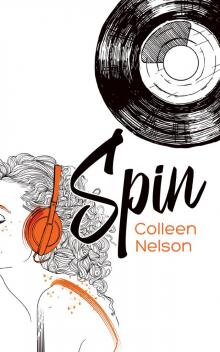 Spin
Spin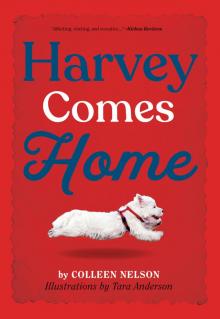 Harvey Comes Home
Harvey Comes Home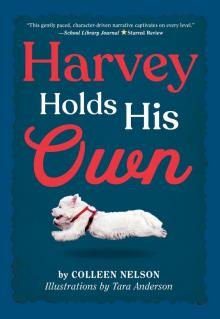 Harvey Holds His Own
Harvey Holds His Own Pulse Point
Pulse Point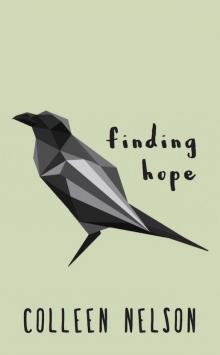 Finding Hope
Finding Hope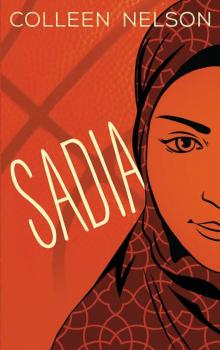 Sadia
Sadia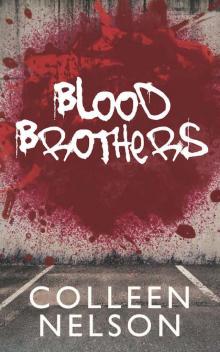 Blood Brothers
Blood Brothers